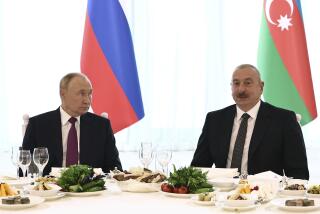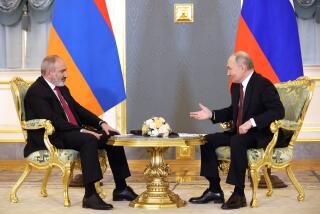Shevardnadze Confers With Arens, Arafat
- Share via
CAIRO — Soviet Foreign Minister Eduard A. Shevardnadze, asserting a role for Moscow in a diplomatic arena long dominated by the United States, met back-to-back Wednesday with Israeli Foreign Minister Moshe Arens and PLO Chairman Yasser Arafat to explore the chances of convening an international peace conference on the Middle East.
Shevardnadze and Arens, who met for nearly three hours at the home of the Soviet ambassador to Egypt, said afterward that some progress had been made toward thawing the chill that has characterized Soviet-Israeli relations for the past 20 years. More meetings, at a lower level, will take place in the near future, they added.
However it was apparent that Shevardnadze, who is making Moscow’s first major diplomatic foray into the Middle East in years, had failed to persuade Arens to soften Israel’s opposition to either an international peace conference or to negotiations with the Palestine Liberation Organization.
While not excluding the possibility of a Soviet role in the peace process, Arens said after the meeting that he informed Shevardnadze that Israel believes direct negotiations between Israel and its Arab neighbors are still “the only way of bringing about peace in the area.”
He also ruled out a role for the PLO in those negotiations, saying the PLO remains, in Israel’s view, “the major obstacle to peace in the area at the present time.”
Several hours after Arens left Cairo, at the end of a 48-hour visit that was also expected to result in modest improvements in Egyptian-Israeli relations, Arafat arrived at the Soviet ambassador’s mansion beside the Nile River for his meeting with Shevardnadze, who is the highest-ranking Soviet official to visit Egypt in nearly 15 years.
Their session lasted for more than three hours. Arafat said that their views on the convening of a Middle East peace conference are “identical.” The PLO chairman added that “I am ready now” for negotiations with Israel, and suggested Moscow as the venue for preliminary talks aimed at paving the way for an international conference.
‘Take Some Time’
Shevardnadze, although conceding that it will “take some time” for Israeli leaders to modify their views on the conference question, said he thinks they will eventually agree to it. “I think that sooner or later the Israelis will understand that this is imperative because the conference will also mean guarantees for the security of Israel and that country needs those guarantees,” he said.
Persuading Israel to show more flexibility on this issue was the ambitious aim that Shevardnadze set for himself when he arrived in the region last week for what is widely seen as the beginning of an intensive effort to restore Soviet influence in the Middle East by playing a more active and serious role in the peace process.
The countries he has visited--Syria, Jordan and Egypt-- warmly welcomed the Soviet initiative, in part because its centerpiece is an international conference, sponsored by the five permanent members of the U.N. Security Council.
A slowly emerging understanding on this issue appeared to be taking shape last year, when then-Israeli Foreign Minister Shimon Peres indicated that he could accept an international conference provided it was used only to legitimize, for the Arab parties, the direct negotiations that would follow it. Then-Secretary of State George P. Shultz agreed to the same formula, although with reservations.
However, since the elections in Israel and the United States last November, the momentum toward an international conference has stalled and possibly even begun to reverse itself.
Israeli Prime Minister Yitzhak Shamir, whose position at the helm of the Likud-Labor coalition was strengthened in Israel’s last elections, fears that an international conference would only generate pressure on Israel to make territorial concessions that his Likud faction opposes. Secretary of State James A. Baker III, stressing that the Bush Administration intends to go slowly in the Middle East, also recently expressed new U.S. doubts over whether the peace process “is best served by a big, high-level, high-visibility conference begun too early.”
Concern that Washington may be backsliding on this question, along with the desire to prod it into taking a more active role in the region, underscores the reception that Egypt and Jordan in particular have accorded the Shevardnadze visit, diplomats and other analysts agreed.
“The Arab moderates are using this visit to send a subtle but significant signal to Washington, which is that the Soviet Union is, at the moment, playing a more constructive and creative role in the Middle East than the United States,” one Western diplomat said. “The message is that, if you want to protect your interests, you’d better get your act together and do it quickly,” he added.
More to Read
Sign up for Essential California
The most important California stories and recommendations in your inbox every morning.
You may occasionally receive promotional content from the Los Angeles Times.













